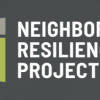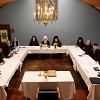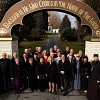- What is your professional background, and how are the skills you’ve acquired professionally applicable for men pursuing a clerical vocation?
Well, I have a BA in Organizational Management, but to be honest, the skills I focus on in my coaching business are skills learned in places other than school. When we go to college, we learn the WHAT of our vocation (how to do what we do), and rarely anything about the WHO (the integral part of who we are as a person). Academic achievement alone does not have the power to change the soul or lead us into deeper repentance. The top places where I learned what I know about humans, how they operate, and what incentives work best include my time in Sarajevo, Bosnia, 14-days after NATO moved into the region to address the Bosnian conflict. I, along with a couple of other men, delivered supplies to local Christians towards the end of the war. We were probably the first American civilians in Sarajevo as the war was ending. Living with a family along “sniper alley” where machine gun fire and mortar rounds were still a daily occurrence, the experience had a direct impact on my understanding of humans in dire circumstances. Funny thing, this family had joy in the midst of war due to the presence of Christ in their lives. The second most notable place was with my boss who took deep interest in developing me using the Christian principles of virtue as his content. I humorously call him my “tormentor” because he decided to mentor me along these lines, but never really asked my permission. His name is Roy Ludwig, who is now reposed, and I would not be where I am today had it not been for this man and his mentoring help. It just goes to show you the impact one person can have, providing inspiration for the rest of us. The last place that I’ll mention is my marriage. Doing the dance in marriage over the last 44 years has added so much to my understanding of humanity. Marriage, when allowed to work in us, helps us to focus on someone else, and not ourselves. It also teaches us humility and patience if we allow God to work through this mechanism. That’s not to say that I’ve arrived – I feel like I’m just beginning – but good work happens there too if we will let it.
- Can you share a bit about your life and history in the Orthodox Church?
My wife and I were Protestant missionaries for about 17 years before reentering the secular workforce. We loved and were dedicated to our faith but kept asking the question, “what about the sacraments?” We also struggled with limited opportunities to go deep with Christ and in the life of His Church. Once we saw the expansive glory in the Orthodox Church (researching Church history had a lot to do with it), there was no turning back. We have four children and at the time we transitioned to the Orthodox Church (in 2011), all four of our kids were married and with no children. Seven of the ten of us were chrismated Orthodox around the same time, and now their children are being raised Orthodox as well. It was a complete turnaround for our entire family.
- Can you reflect a bit on your relationship with St Tikhon’s Seminary?
My relationship with St Tikhon’s began at the All-American Council in Atlanta GA (July of 2015). I met the previous Dean of STOTS there and at the time the seminary was addressing requests from ETS to address conflict management to obtain re-accreditation as an educational institution. Since conflict management and human incentive systems are such a big part of my executive coaching business, we connected on that front. I visited STOTS, prepared a presentation for the Board, and then assisted with a beginning program to address conflict issues. It all started there but went dormant after that until meeting Fr John Parker a couple of years ago.
- How long have you done work with St Tikhon’s and how would you like to see your work develop here?
Again, I’ve been associated with St Tikhon’s since July of 2015. At that time, I presented Middle Way concepts to the Board as a mechanism to address conflict. We discussed how this church-based approach would help build and develop human relationships and foster more productive communication skills at the seminary. It was a joy to get a second opportunity to engage on the Middle Way with Fr John Parker over the last two years. We have now been able to infuse these concepts into seminarian hearts and minds, and institutionalize this information at the seminary in the form of a Middle Way document. My heart’s desire is to see STOTS to continue to grow in their mission and produce priests who are not only good at the WHAT, but also with the WHO – men who have strength in character and know how to develop parishes with this same strength. The end goal is to glorify God and ensure parish health.
- How have you found your time here at St Tikhon’s? Can you offer any astute observations about the life and people at our seminary?
There is no place like STOTS!! I love every minute when I’m here – it’s a respite and a little piece of heaven. The hierarchs, the monks, the priests, and priests’ wives, along with the faculty, staff and students are all remarkable. In this day and age where our Christian faith is so important to our local, national and international health, observing what is happening at STOTS on a daily basis encourages me and assures me that our God is alive and active in our current day and age, and is evidence of His love for humanity. I hope you’ll let me come back!
|
| |||||||||||||
Physical Address:
178 St. Tikhon's Road
Waymart, PA 18472
Mailing Address:
Post Office Box 130
South Canaan, PA 18459
Phone: 570-561-1818





